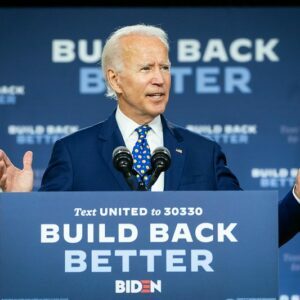Economists are warning of hidden taxes in the new federal budget going through Congress, despite President Joe Biden’s pledge to oppose increases for people making less than $400,000 a year.
During his campaign and in the White House, Biden has repeated his no-tax pledge again and again. As recently as this May Biden assured Americans, ‘”Anybody making less than $400,000 a year will not pay a single penny in taxes.”
But economists say the specifics of his spending plan reveal it’s a pledge Biden will violate if he can get his legislation through Congress.
Some of the tax hikes are hidden, like the impact of business tax hikes on middle-class families. Others are more direct, like increased energy costs due to Democrats’ green proposals, and the proposed “Tobacco Tax Equity Act,” which would double the federal tax on cigarettes, disproportionately hitting low-income families and people of color.
According to data from the CDC, New Hampshire households earning less than $35,000 are twice as likely to have a smoker than those earning $50,000 or more.
Erica York, an economist with the non-partisan Tax Foundation’s Center for Federal Tax Policy, is focused on business tax increases which, she told InsideSources, will be passed on to middle-income Americans despite Congress not taxing their income directly.
“The $400,000 pledge is simply not workable,” York said. “It might fly by political standards, but it doesn’t by economic standards. We don’t yet have details on the exact proposals lawmakers are going to use to pay for the reconciliation bill, but it will likely include business tax increases such as a higher corporate income tax rate.”
The Tax Foundation has published an analysis on its website of the average tax change by state and congressional district from 2022 to 2031, based on Biden’s fiscal year 2022 budget, including the American Families Plan (AFP) and American Jobs Plan (AJP). After 2025, when the large expansion of the Child Tax Credit would expire, it shows that nearly all jurisdictions would get hit with higher taxes.
“Every tax increase comes with trade-offs, and it would be better to acknowledge such trade-offs rather than make unworkable promises,” York said.
Brandon Arnold, executive vice president of the conservative National Taxpayers Union, was blunter.
“I think the Biden plan is absolutely going to raise taxes on people making less than $400,000 a year,” Arnold said. “The most obvious reason is the corporate tax increase.”
Arnold sees other potential hidden taxes in the carbon tariff, details about which remain murky despite its being initially slated to hit raw materials, and in Biden’s desire to repeal all the tax cuts in Trump’s Jobs Act he says benefitted people in lower-income brackets.
Kyle Pomerleau, a senior fellow specializing in federal tax policy at the right-leaning American Enterprise Institute, said the latest version of the infrastructure package carries little risk of violating Biden’s pledge in and of itself since it contains few new sources of revenue. However, in the infrastructure bill passed by the Senate, he emphasized a proposed reinstatement of the superfund excise tax.
“This tax is paid by manufacturers and importers of certain chemicals,” Pomerleau said. “While paid directly by businesses, the burden of excise taxes, to some degree, falls on individuals. Some of those individuals presumably will be earning less than $400,000 a year.”
Lawmakers are also considering the $3.5 trillion budget reconciliation bill, where Pomerleau expects the corporate hikes from Biden’s budget proposal to resurface.
“The resolution does not have any policy specifics yet, but there are several tax increases that Democratic lawmakers have expressed support for that would raise taxes, indirectly, on those earning less than $400,000,” he said. “This includes corporate tax increases raising the rate to 28 percent and increasing the burden on foreign profits, and excise taxes on polluters [in the form of] taxes on imports.
And then there’s the pilot program for mileage fees which, like the tobacco tax hike, some fear would disproportionately impact blue-collar workers and rural Americans with less access to mass transit.
Baruch Feigenbaum, senior managing director of transportation policy at the libertarian Reason Foundation, is a supporter of per-mile road fees.
“The way his pledge is framed, it’s stupid, because we think transportation should be funded by mileage-based user fees,” Feigenbaum said. “There’s a pilot for that in the infrastructure bill, but the way it’s written is net-neutral.”
He added, “Funding it through deficit spending is more problematic, but he’s got the votes for it and it’s going to happen. I just think it kicks the can down the road because our kids and grandkids are going to have to pay the debt and interest on it.”
Feigenbaum said the final infrastructure legislation “could wind up being worse” depending on what gets included from the House infrastructure bill, “because there’s a lot in it that has nothing to do with transportation that they’re hoping to push through the Senate.”
The Joint Committee on Taxation (JCT), the nonpartisan scorekeeper for Congress, recently lent credence to these concerns with a report that Biden’s proposed corporate hikes would raise the tax burden on most ordinary wage earners, violating his “not-one-penny” pledge.
In a JCT memo dated Aug. 3, Thomas A. Barthold concluded the proposed corporate hikes would raise taxes for tens of millions of taxpayers making under $100,000 per year, and tens of millions more making under $400,000 per year.





